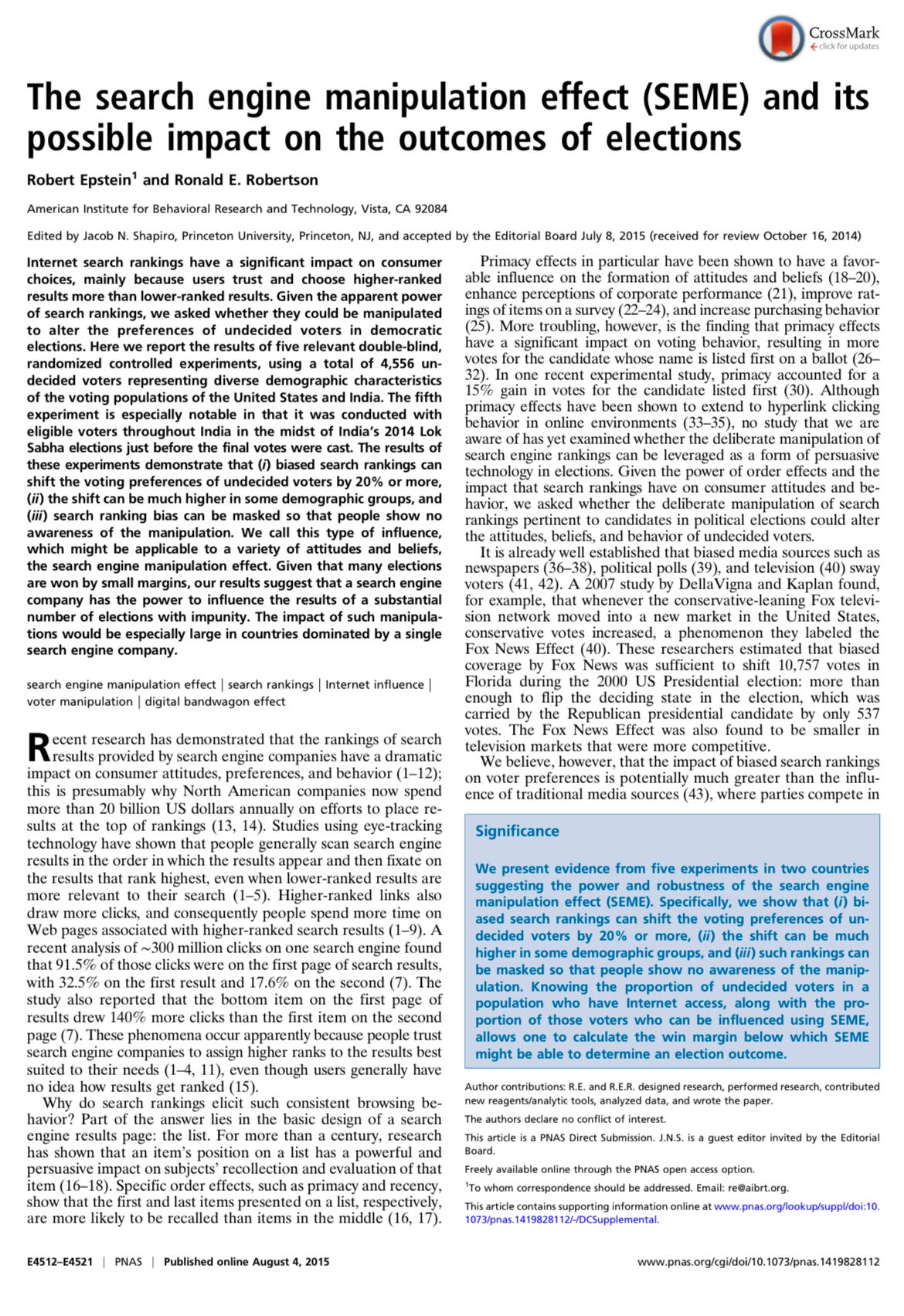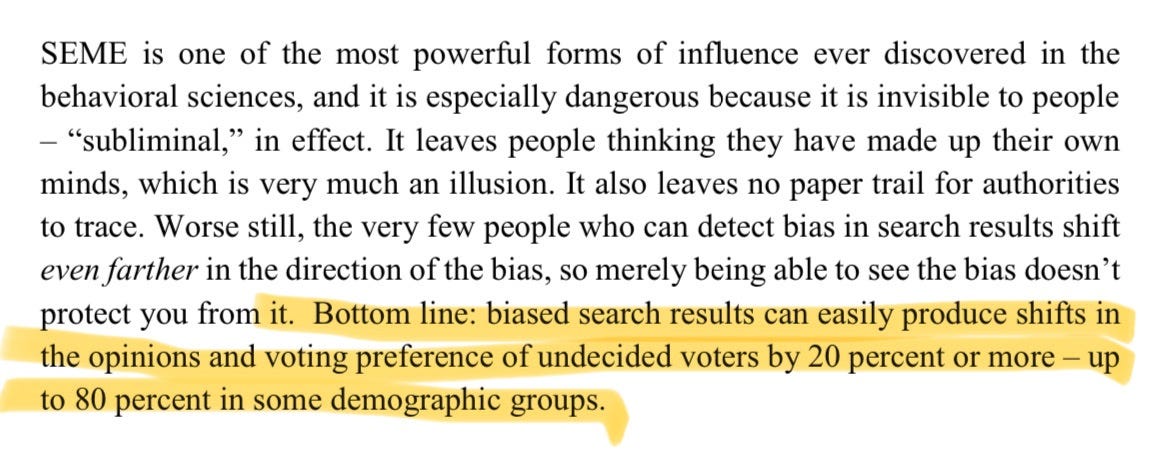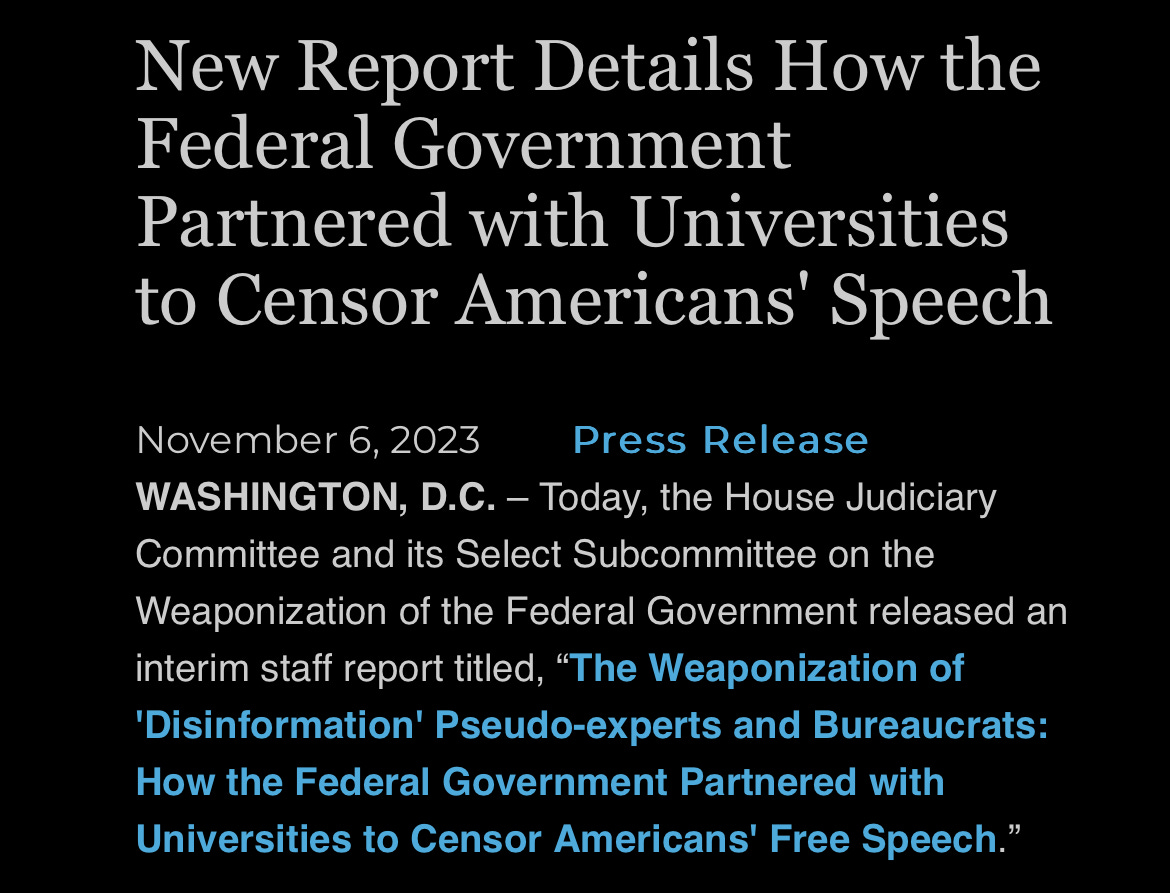The Existential Effects of Google's Ephemeral Experiences
Google search results are allegedly being used to ensure 'preferable election outcomes’ by generating a biased algorithmic feed for its unwitting users
“They’re using ephemeral experiences to manipulate people on a massive scale, people don’t know they’re being manipulated, and there’s no record kept of those experiences, they’re just generated for you on the fly and then they disappear.”
-Dr. Robert Epstein
Have you ever wondered whether you’d get the same search results twice when googling something?
Well, you won’t, and you wouldn’t know if you did, according to the man who created a system for archiving these fleeting interactions called Ephemeral Experiences. His name is Dr. Robert Epstein. My introduction to him was an appearance on Tim Pool’s Culture War Podcast, an episode that focused heavily on Google’s algorithmic manipulations and the impact they have on our elections.
He’s made some rather damning accusations against Google, a company known for its willingness to censor information despite warning about a rise in government requests for censorship back in 2012. His assertions are backed by peer-reviewed research, some of which will be included in this article via hyperlinks and citations.
The clip above is a relatively short video highlighting the key components of his arguments. It should make it easier to understand the basics of Dr. Epstein’s claims surrounding Google’s alleged bias and manipulations.
Who is Dr. Robert Epstein?
Dr. Robert Epstein is a distinguished research psychologist and the former editor-in-chief of Psychology Today. He has a Ph.D. from Harvard University and is the Senior Research Psychologist at the American Institute for Behavioral Research and Technology.
He has published 15 books and more than 300 articles on artificial intelligence and other topics. He has served in an administrative role at Bay Psychiatric Associates for many years and his practice includes psychiatric consultation, individual psychotherapy, and medication consultation and management for children, adolescents, adults, and seniors.
He has published articles about his research on Google in both scientific publications and a wide array of mainstream news sources, including but not limited to:
TIME magazine
U.S. News & World Report
USA Today
Dissent
The Hill
Huffington Post
The Daily Caller
Russia’s Sputnik News
Bloomberg’s BusinessWeek
He also considers himself “left-leaning,” although he has been championed by many on the right for his work in exposing the undetectable political power they hold and subsequently use against the different peoples to ensure their political interests are protected.
In testimony he presented to the Senate Judiciary Committee, Dr. Epstein stated:
“I am here today for three reasons: to explain why Google presents a serious threat to democracy and human autonomy, to explain how passive monitoring systems can protect us both now and in the future from companies like Google, and to tell you how Congress can immediately end Google’s worldwide monopoly on search.”
How does Dr. Epstein conduct his research?
All experiments are randomized controlled, double-blind, and counterbalanced. Multiple experiments over 5 years have involved more than 10,000 participants across diverse demographics, and when possible, representative of the voting population.
Most participants selected are “undecided” in regard to the election materials shown to them.
All search results and web pages used in the experiments are real, drawn from the internet and from Google’s search engine. The elections we have examined are also real: the 2010 election for Prime Minister of Australia; the 2014 Lok Sabha election in India; the 2015 national election in the UK, and the 2016 and 2018 elections in the U.S.
He uses a mock search engine called Kadoodle, which looks and functions almost exactly like Google, except they control the search results shown to participants, and all links on pages displayed to participants are disabled to ensure a “closed online environment."
In the basic procedure, participants are randomly assigned to one of three groups: a group in which search results favor Candidate A – which means that high-ranking results link to web pages that make Candidate A look better than his or her opponent – a group favoring Candidate B, and a group in which neither candidate is favored in search results (the control group).
Participants are told they will be asked to use our custom search engine, Kadoodle, to conduct research on political candidates. They are first asked to read short paragraphs about each candidate and then asked several questions about each candidate: How much they like each candidate, trust each candidate, and so on. They are also asked, both in a binary fashion and on a scale, which candidate they would vote for if they had to vote today. These are all “pre-search questions.”
Then, typically, they are given up to fifteen minutes in which to use the Kadoodle search engine to conduct further research about the candidates. They are typically given access to five pages of search results, with six results per page (30 in total), and they can navigate through the search results and the web pages exactly as they would on Google. They can stop searching when they please.
Then they are asked those same questions about the candidates; now these are “post-search questions.”
The only difference between the three groups is the order in which the search results are shown. All participants in all three groups have full access to all the search results and all the web pages.
The typical findings are as follows:
Prior to the search, all three groups tended to answer the pre-search questions the same way.
After the search, the opinions and voting preferences of people in the control group shift very little or not at all.
After the search, both the opinions and the voting preferences of people in the two bias groups shift fairly dramatically in the direction of the favored candidate. In other words, opinions and votes shift in opposite directions in the two groups.
A shift of 20 percent or more is typical. In large studies in which we have enough participants to look at demographic differences, we have found shifts in the 60-to-80 percent range in some demographic groups. In other words, some people are especially trusting of search results.
Typically, very few people show any awareness of the bias they have seen. In a large study we conducted in India in 2014, for example – a study with more than 2,000 undecided voters throughout India in the midst of an intense election – 99.5 percent of our participants showed no awareness of bias in the search results we showed them.
The very few people who do detect the bias tend, on average, to shift even farther in the direction of the bias.
Dr. Epstein suggests that people seemingly believe the algorithmic output is “objective” and “unbiased” because it is a computer-generated output. He also suggests, that similarly to the rats in a Skinner Box, people are conditioned to believe that search results appearing at the top of the list are superior sources, with truer results, than those further down the list.
To backtest the theory that politically biased search results being algorithmically listed within the top 10 results has an impact on people’s perception, they randomized the position of such results which showed the results had less of an impact.
Is Google really manipulating elections?
If these allegations have any merit, Google has effectively learned to control election outcomes with an algorithm. People’s opinions, their voting habits, their likelihood of voting on Election Day, and their entire perception of reality really, are all algorithmically manipulated to tilt the scales towards whichever side Google aligns with. After witnessing the manifestation of people’s distrust in our elections, amongst other things, it seems pertinent that this particular issue be resolved.
Dr. Epstein isn’t the only one concerned with the potential impact of algorithms on political outcomes.
The LA Times reported:
“We need to understand the potential political impact of these underneath-the-hood choices” by tech companies, said Jacob Shapiro, a professor of politics and international affairs at Princeton. “The question we should be asking is, what do we need to do to nail down how consequential this is? And what systems do we need to create as a society to minimize the negatives?”
They cite a UCLA professor named Safiya Noble who, despite concerns over the premise that outlets like Breitbart should get more exposure considering their popularity when compared to traditionally left-leaning outlets, does agree with the larger point that Google should not be guiding crucial societal questions, such as how we vote.
“We use these search engines as if they are arbiters of truth, and they are not. They are global advertising platforms. They are not fact checkers or public interest technologies. … The minute you start to engage these broader social issues on a search engine, you run up against its limits.”
In the testimony Dr. Epstein gave to the Senate Judiciary Committee back in June of 2019, he lays out the key findings from his research.
Dr. Epstein is collecting search result data using a system he’s deployed on the computers of volunteers (they get paid 25$ a month for volunteering) that captures the ephemeral experiences Google dishes out to its users. This allows not only researchers and users to better understand the nature of the platform they’re interacting with, but it also enables authorities to conduct investigations into the platform’s practices.
The first thing he points to is something he deemed SEME, or “Search Engine Manipulation Effect.” He touts a high degree of legitimacy behind this newly discovered behavioral science theory and argues that it’s “especially dangerous” because of the widespread impact it has on unwitting users. The paper was published in the Proceedings of the National Academy of Sciences.
Dr. Epstein argues that Google’s search engine handed 2,600,000 votes to Hillary Clinton in the 2016 election by simply showing users search results that were favorable to Hillary. The data collected, purportedly consisting of 13,000 election-related researches conducted by a diverse group of Americans, shows that the first 10 results consistently favored Hillary in both blue and red states.
Bottom Line: biased search results can easily produce shifts in the opinions and voting preference of undecided voters by 20 percent or more - up to 80 percent in some demographic groups.
There are 4 additional key findings he attested to in his testimony to the Judiciary Committee.
“Go Vote” reminders displayed on Google’s homepage gave one political party between 800,000 and 4,600,000 more votes than it gave the opposing party.
Google MAY have shifted upwards of 78,200,000 votes to candidates of one political party. This number is based on data captured by his 2018 monitoring system.
Google’s “autocomplete” search suggestions CAN turn a 50/50 split, among undecided and unwitting voters, into a 90/10 split.
Google has likely been determining the outcomes of upwards of 25 percent of the national elections worldwide since at least 2015.
The growing evidence of government, corporate, and institutional collusion to violate constitutional rights of Americans
This likely comes as no surprise to many. However, the shocking scale of Google’s impact is where the focus needs to reside. The prospect of a single company having the ability to manipulate public opinion, subsequently altering the results of elections globally by simply adjusting the algorithm, poses a real threat to democracies abroad, and our own democratic institutions here in the United States.
Combining this with the discovery of government collusion with Big Tech and Social Media platforms, the average person stands little chance against the undue influence and subversion of their rights.
From my perspective, there are no ethical grounds for subjecting users to such deceitful tactics. The severity of the accusations reaches an existential level. An entire nation’s governance style and choice of representation, is being dictated without their knowledge — even if many suspected this to be the case.
I have zero confidence that this is an isolated problem. It would be dishonest for me to suggest that it’s “unlikely” the government is pressuring and/or working with companies like Google to weaponize their tech against those they are supposed to represent. It would seem there is a coordinated and calculated complex, one comprised of government and big tech corporations, that is working against the American people’s interests.
It is a fact that government officials, in their official capacity, alongside other NGO’s, have been using Tech platforms to censor American’s constitutionally protected speech — it goes without saying that it is speech that’s unfavorable to those doing the censoring.
In a recently released Report by the Judiciary committee, they outline how DHS, CISA, GEC, and Stanford University coordinated their efforts to censor Americans, leading up to the 2020 elections.
The report reveals how the Department of Homeland Security's (DHS) Cybersecurity & Infrastructure Security Agency (CISA) and the Global Engagement Center (GEC, within the State Department) coordinated with Stanford University and other entities to create the Election Integrity Partnership to censor Americans' speech in the lead-up to the 2020 election. It outlines how the Election Integrity Project (EIP) was created in the summer of 2020 to provide a way for the federal government to launder its censorship activities in hopes of bypassing both the First Amendment and public scrutiny. The report also reveals for the first time internal emails from EIP members stating that the EIP was created "at the request of DHS/CISA."
The Missouri v Biden lawsuit is currently making its way through the courts and is looking specifically at the constitutionality of the collusion between government and private tech platforms. The Supreme Court is going to be addressing whether the injunction on communications between government and social media companies will remain in effect, sometime in spring of 2024.
However, for the time being, the injunction will be stayed, allowing for continued censorship until SCOTUS addresses this.







The full link to the TCW episode.
https://www.youtube.com/live/XgpIHS0HUbg?si=usVzyfDb8bZnWQAa